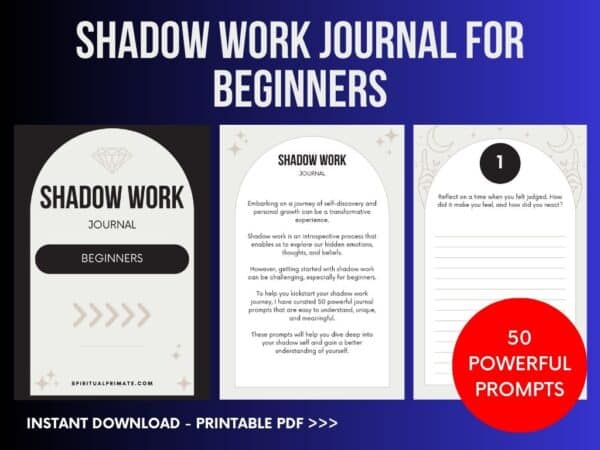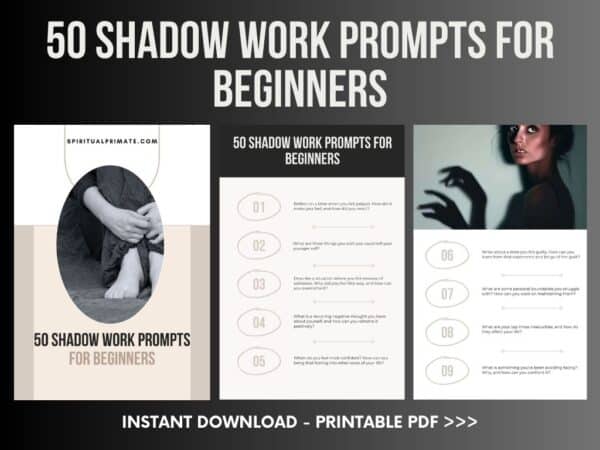Embarking on a journey of self-discovery and personal growth can be a transformative experience. Shadow work is an introspective process that enables us to explore our hidden emotions, thoughts, and beliefs. However, getting started with shadow work can be challenging, especially for beginners.
To help you kickstart your shadow work journey, I have curated 50 powerful journal prompts that are easy to understand, unique, and meaningful.
These prompts will help you dive deep into your shadow self and gain a better understanding of yourself.
Tips and Advice for Beginners
Shadow work is a self-exploration process that encourages individuals to examine and understand their hidden thoughts, emotions, beliefs, and desires. By acknowledging and integrating these aspects of oneself, a person can achieve personal growth, greater self-awareness, and emotional healing. If you’re new to shadow work, this guide will provide you with essential tips and advice to help you get started on your journey towards self-discovery.
Set Your Intentions
Before you begin, it’s essential to set your intentions for what you hope to achieve through shadow work. Remember, this process is about self-discovery and personal growth, not self-criticism or judgment. Approach shadow work with an open mind and a willingness to embrace vulnerability and self-compassion.
Create a Safe Space
Find a quiet, comfortable space where you can dedicate time to your shadow work practice without distractions. This could be a dedicated room in your home, a quiet corner, or even a peaceful outdoor setting. Ensure that you feel safe and comfortable in this space as you engage in self-reflection.
Establish a Routine
Consistency is key when it comes to shadow work. Set aside regular time to engage in this practice, whether it’s daily, weekly, or monthly. Establishing a routine will help you create a strong habit and make it easier to commit to your personal growth journey.
Use Journaling as a Tool
Journaling is an effective tool for shadow work, as it allows you to express your thoughts and emotions openly and honestly. Writing down your feelings can help you gain clarity, process emotions, and uncover patterns in your behavior. Experiment with different journaling techniques, such as free writing, prompted journaling, or even drawing and doodling to find what resonates with you.
Practice Mindfulness and Meditation
Mindfulness and meditation can be valuable tools for shadow work, as they help you cultivate self-awareness and connect with your inner thoughts and emotions. Begin by setting aside time each day to practice mindfulness, focusing on your breath and observing your thoughts without judgment. This will help you become more attuned to your emotions and make it easier to identify areas for growth in your shadow work practice.
Seek Support
Shadow work can be a challenging and sometimes emotional process. It’s essential to seek support from trusted friends, family members, or a therapist as you navigate your journey. Surrounding yourself with a supportive network can help you feel more confident and secure in your self-exploration.
Be Patient and Compassionate
Personal growth is a lifelong journey, and shadow work is no exception. It’s essential to be patient with yourself as you navigate this process and allow yourself the time and space to grow and learn. Remember that everyone’s journey is unique, and it’s crucial to practice self-compassion and kindness throughout your shadow work journey.
Final Advice
Embarking on a shadow work journey can be a transformative experience that leads to personal growth, self-awareness, and emotional healing. By setting clear intentions, creating a safe space, and utilizing tools like journaling and meditation, you can begin to uncover and integrate the hidden aspects of yourself. Remember to be patient and compassionate with yourself as you navigate this journey, and don’t be afraid to seek support from others along the way. Embrace the process, and watch as you grow and evolve on your path to self-discovery.
Shadow Work Prompts for Beginners
- Reflect on a time when you felt judged. How did it make you feel, and how did you react?
- What are three things you wish you could tell your younger self?
- Describe a situation where you felt envious of someone. Why did you feel this way, and how can you overcome it?
- What is a recurring negative thought you have about yourself, and how can you reframe it positively?
- When do you feel most confident? How can you bring that feeling into other areas of your life?
- Write about a time you felt guilty. How can you learn from that experience and let go of the guilt?
- What are some personal boundaries you struggle with? How can you work on maintaining them?
- What are your top three insecurities, and how do they affect your life?
- What is something you’ve been avoiding facing? Why, and how can you confront it?
- List three things you admire about yourself and three things you’d like to improve.
- What are some limiting beliefs you have about yourself? How can you challenge them?
- Write about a time you felt angry. What was the cause, and how can you better manage anger in the future?
- What are some unhelpful coping mechanisms you use? How can you replace them with healthier alternatives?
- Reflect on a time when you were dishonest with yourself. Why did you do it, and how can you practice honesty in the future?
- What are some aspects of your personality that you feel need to be healed? How can you work on healing them?
- When do you feel most authentic? How can you bring that authenticity into other areas of your life?
- What are some fears that hold you back? How can you confront and overcome them?
- Describe a situation where you felt a strong sense of shame. How can you work on self-forgiveness in similar situations?
- Write a letter to someone you have unfinished business with. What would you say, and how would it help you move forward?
- What are your top three values? How well do your actions align with these values?
- What does self-love mean to you? How can you practice it daily?
- Describe a situation where you felt powerless. How can you regain your power in similar situations?
- What are some things you want to achieve in life? What’s stopping you from pursuing them?
- What is a self-sabotaging behavior you engage in? How can you work on breaking this pattern?
- Describe a time when you felt deeply hurt by someone. How can you heal from that pain and find forgiveness?
- What are some negative thought patterns you have? How can you challenge and change them?
- How do you react to criticism? How can you develop a healthier response to it?
- What are some areas of your life where you feel stuck? How can you create movement and growth?
- Reflect on a time when you felt unworthy. How can you work on building self-worth in the future?
- What does self-compassion mean to you? How can you practice it daily?
- What are some expectations you have for yourself? Are they realistic and healthy?
- Write about a time when you felt disappointed in yourself. How can you learn from that experience and move forward?
- What is a difficult decision you’ve had to make? How did you handle it, and what did you learn from it?
- What are some things you need to let go of to grow as a person?
- Reflect on a time when you felt jealous. How can you transform that negative emotion into a positive one?
- What are some self-care practices you can incorporate into your daily routine?
- Describe a situation where you felt rejected. How can you work on building resilience and self-acceptance?
- What are some patterns in your relationships that you want to change? How can you work on improving them?
- Write about a time you felt vulnerable. How can you embrace vulnerability and use it to connect with others?
- What is a core belief you have about yourself that may not be true? How can you challenge and reframe it?
- Describe a time when you felt alone. How can you cultivate a supportive network of people in your life?
- What are some things you’re avoiding doing out of fear? How can you take small steps towards facing those fears?
- Reflect on a time when you felt like you didn’t belong. How can you find a sense of belonging in different areas of your life?
- What is a limiting story you tell yourself about your past or future? How can you create a new narrative?
- Describe a time when you felt like you weren’t enough. How can you work on building self-compassion and self-esteem?
- What are some habits or behaviors you engage in that don’t align with your values? How can you work on changing them?
- Write about a time when you felt lost or unsure of your path. How can you explore your passions and purpose?
- What are some ways you can practice forgiveness, both towards yourself and others?
- Describe a time when you felt like you were hiding your true self. How can you work on expressing yourself authentically?
- What is a positive affirmation you can repeat to yourself daily to cultivate self-love and inner peace?
Shadow work is an ongoing process that requires time, patience, and self-compassion. By exploring your shadow self and integrating its aspects, you can experience emotional healing, personal growth, and inner peace. Journaling is a powerful tool that can aid you in this journey.
I hope that these 50 journal prompts will help you get started on your shadow work journey and empower you to unleash your inner growth. Remember to be gentle with yourself, seek support when needed, and embrace the process of self-discovery.
Dive Deeper Into Your Shadow Work Journey
- Product on sale
 Printable Shadow Work Journal for Beginners [PDF]Original price was: $11.98.$5.99Current price is: $5.99.
Printable Shadow Work Journal for Beginners [PDF]Original price was: $11.98.$5.99Current price is: $5.99. - Product on sale
 50 Shadow Work Prompts for Beginners | Printable PDFOriginal price was: $5.98.$2.99Current price is: $2.99.
50 Shadow Work Prompts for Beginners | Printable PDFOriginal price was: $5.98.$2.99Current price is: $2.99.

